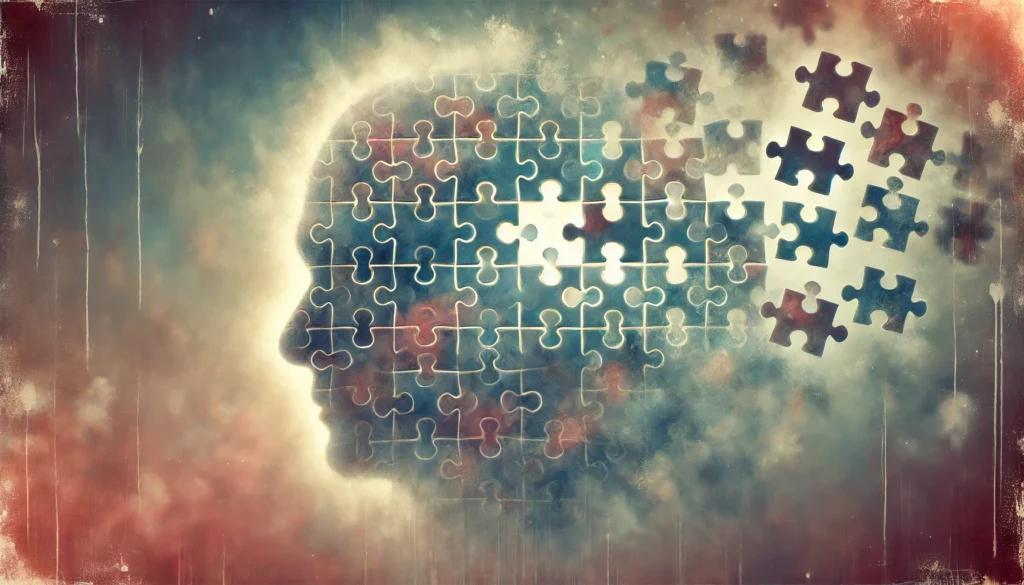Memory loss is a common concern that affects millions of individuals globally. This condition, often associated with aging, can also be a symptom of various neurological disorders. Understanding the nuances of memory loss and its synonyms is crucial for health professionals, caregivers, and individuals seeking to optimize brain health.
In this comprehensive guide, we will delve into the different synonyms for memory loss, exploring their meanings, contexts, and implications.
You may also like: Effective Techniques for Short Term Memory Boost
Understanding Memory Loss
Memory loss, in its simplest form, refers to the inability to recall information that was previously known. It can be temporary or permanent, mild or severe, and can affect individuals of any age. Understanding the underlying causes of memory loss is essential in addressing it effectively.
The Nature of Memory
Memory is a complex process involving the encoding, storage, and retrieval of information. It is fundamental to learning, decision-making, and personal identity. Disruptions in any part of the memory process can lead to memory loss, making it crucial to understand how memory functions in the brain.
Types of Memory Loss
Memory loss can be categorized into various types, including short-term, long-term, and working memory loss. Short-term memory loss affects immediate recall, while long-term memory loss impacts stored information over time. Working memory loss involves the temporary holding of information for processing.
The Role of Neurotransmitters
Neurotransmitters such as dopamine, serotonin, and acetylcholine play critical roles in memory function. Imbalances or disruptions in these chemicals can contribute to memory issues, highlighting the importance of maintaining brain chemistry for optimal cognitive health.
Common Causes of Memory Loss
Before diving into the synonyms, it’s important to understand the common causes of memory loss. These include:
Aging and Cognitive Changes
As people age, changes occur in all parts of the body, including the brain. These changes can result in memory lapses, which are often considered a normal part of aging. Understanding how aging affects cognitive function can help differentiate between normal age-related forgetfulness and more severe memory problems.
Neurological Disorders
Conditions such as Alzheimer’s disease, dementia, and Parkinson’s disease are associated with severe memory impairment. These disorders impact brain structures and functions, leading to progressive memory decline and the need for specialized care and management.
Psychological Factors
High levels of stress and anxiety can interfere with memory retention and recall. Psychological factors such as depression and trauma can also contribute to memory issues, necessitating a holistic approach to mental health to support cognitive well-being.
Lifestyle and Environmental Influences
Lack of adequate sleep, poor diet, and a sedentary lifestyle can lead to cognitive issues, including forgetfulness. Environmental factors, such as exposure to toxins and lack of mental stimulation, also play a role in memory health, emphasizing the need for a balanced lifestyle.
Substance Abuse and Medication Side Effects
Excessive use of alcohol and drugs can damage brain cells and lead to memory problems. Certain medications, particularly those affecting the central nervous system, can also cause side effects that impact memory, highlighting the importance of medical review in managing cognitive health.
Synonyms for Memory Loss
When discussing memory loss, several terms and phrases are often used interchangeably. However, each has its unique context and connotation.

Forgetfulness
Forgetfulness is perhaps the most commonly used synonym for memory loss. It refers to the occasional inability to remember information or tasks. While forgetfulness is a normal part of life, frequent occurrences may indicate underlying cognitive issues.
Everyday Forgetfulness
Everyone experiences forgetfulness from time to time, such as misplacing keys or forgetting an appointment. These minor lapses are typically harmless and can be managed with organizational strategies and reminders.
Forgetfulness in Aging
As individuals age, forgetfulness may become more frequent. It’s important to distinguish between normal age-related forgetfulness and signs of more serious conditions like dementia, which require medical intervention.
Strategies for Managing Forgetfulness
Implementing memory aids such as lists, alarms, and calendars can help manage forgetfulness. Engaging in memory exercises and maintaining a healthy lifestyle can also support cognitive function and reduce forgetful episodes.
Cognitive Decline
Cognitive decline encompasses a broader spectrum of symptoms, including memory impairment. It refers to the gradual deterioration of cognitive functions, such as thinking, reasoning, and memory. Cognitive decline is often associated with aging and neurological disorders.
Early Signs of Cognitive Decline
Early signs of cognitive decline may include difficulty finding words, losing track of time, and struggling with complex tasks. Recognizing these early signs is crucial for timely intervention and management.
Risk Factors for Cognitive Decline
Genetics, lifestyle, and overall health can influence the risk of cognitive decline. Understanding these risk factors can guide preventive measures and promote long-term cognitive health.
Interventions for Cognitive Decline
Cognitive training, physical exercise, and a nutritious diet are key interventions for slowing cognitive decline. Pharmacological treatments and therapies may also be recommended for individuals with significant cognitive impairment.
Memory Impairment
Memory impairment is a clinical term used to describe a significant reduction in the ability to remember information. It is often used in medical settings to diagnose memory disorders.
Assessment of Memory Impairment
Medical professionals use various assessments, including cognitive tests and brain imaging, to diagnose memory impairment. Accurate diagnosis is essential for developing appropriate treatment plans.
Causes of Memory Impairment
Memory impairment can result from numerous causes, including traumatic brain injury, neurological conditions, and infections. Identifying the root cause is vital for effective management and rehabilitation.
Rehabilitation for Memory Impairment
Rehabilitation strategies for memory impairment may involve cognitive therapy, memory exercises, and occupational therapy. Support from healthcare providers and caregivers is crucial for successful rehabilitation.
Memory Lapses
Memory lapses refer to temporary episodes of forgetfulness. These lapses can occur due to stress, fatigue, or distraction and are generally not indicative of serious memory problems.
Common Triggers for Memory Lapses
Stress, multitasking, and lack of sleep are common triggers for memory lapses. Identifying these triggers can help in managing and reducing the frequency of lapses.
Differentiating Memory Lapses from Disorders
It is important to differentiate between benign memory lapses and signs of memory disorders. Consulting a healthcare professional can provide clarity and peace of mind.
Techniques to Minimize Memory Lapses
Practicing mindfulness, reducing stress, and ensuring adequate rest are effective techniques for minimizing memory lapses. Staying organized and focused can also help improve memory recall.
Amnesia
Amnesia is a more severe form of memory loss, characterized by the inability to recall past experiences or form new memories. It can be caused by brain injury, illness, or psychological trauma.
Types of Amnesia
Amnesia can be classified into various types, including retrograde amnesia (loss of past memories) and anterograde amnesia (inability to form new memories). Each type has distinct causes and implications.
Psychological and Physiological Causes
Amnesia may result from traumatic experiences, brain injuries, or neurological disorders. Understanding the underlying cause is crucial for tailoring treatment and support.
Treatment and Recovery from Amnesia
Treatment for amnesia often involves cognitive rehabilitation, psychotherapy, and addressing underlying medical conditions. Recovery can vary depending on the severity and cause of the amnesia.
Other Synonyms
- Memory Problems: A general term encompassing various issues related to memory loss.
- Memory Issues: Similar to memory problems, this term is used to describe difficulties in remembering information.
- Cognitive Issues: A broad term that includes memory loss as well as other cognitive dysfunctions.
Memory Problems in Everyday Life
Memory problems can impact daily activities and quality of life. Addressing these problems through lifestyle modifications and support can enhance overall well-being.
Professional Perspectives on Memory Issues
Healthcare professionals approach memory issues with a comprehensive assessment to determine the underlying causes and appropriate interventions. Collaborative care is often necessary to address complex cases.

Cognitive Issues Beyond Memory
Cognitive issues can include challenges with attention, language, and problem-solving. Understanding the full scope of cognitive dysfunctions is essential for holistic care and support.
Historical Context of Memory Loss
Memory loss has been a subject of fascination and study for centuries. Ancient civilizations recognized the impact of memory on human experience and sought to understand its mysteries.
Ancient Perspectives
In ancient Greece, philosophers like Aristotle explored the nature of memory and its loss, linking it to the soul’s faculties. Historical texts from India and China also discuss memory loss in the context of aging and spiritual practices.
Memory in Ancient Greek Philosophy
Greek philosophers considered memory a vital component of the human soul. Aristotle’s works explored how memory influenced identity and knowledge, laying the groundwork for future studies on memory.
Eastern Philosophies on Memory
In ancient India and China, memory was viewed through the lens of spirituality and mindfulness. Practices such as meditation were believed to enhance memory and cognitive function, highlighting the link between mental discipline and memory.
Cultural Interpretations of Memory Loss
Cultural beliefs have shaped interpretations of memory loss throughout history. Understanding these interpretations can provide insight into how different societies perceive and address memory issues.
Modern Understanding
With advancements in neuroscience, our understanding of memory loss has evolved significantly. Today, we recognize the intricate processes involved in memory formation and recall, as well as the various factors that can disrupt these processes.
The Role of Neuroscience
Neuroscience has illuminated the complex networks and processes involved in memory function. Research on brain plasticity and neural pathways has enhanced our understanding of how memory is formed and retrieved.
Technological Advances in Memory Research
Technological innovations, such as brain imaging and genetic analysis, have revolutionized memory research. These tools enable scientists to study memory processes in detail and develop targeted interventions.
Interdisciplinary Approaches to Memory
Memory research now integrates insights from psychology, biology, and technology. This interdisciplinary approach fosters a comprehensive understanding of memory and its disorders, paving the way for innovative treatments.
Current Trends and Future Implications
As research continues, new insights into memory loss and its treatment emerge.
Breakthroughs in Brain Science
Recent studies have highlighted the potential of nootropics and brain-training exercises in mitigating memory decline. These interventions aim to enhance cognitive function and protect against memory disorders.
Emerging Nootropic Compounds
Nootropics, or cognitive enhancers, are gaining attention for their potential to improve memory and cognitive function. Research is ongoing to identify safe and effective compounds that can support brain health.
Brain-Training Technologies
Technological advancements have led to the development of brain-training apps and programs designed to enhance memory and cognitive skills. These tools offer accessible ways to engage in cognitive exercises and monitor progress.
The Impact of Exercise on Memory
Physical exercise is increasingly recognized for its benefits on brain health. Studies show that regular physical activity can enhance memory and cognitive function, highlighting the importance of an active lifestyle.
Biohacking and Memory Optimization
The biohacking community is at the forefront of exploring innovative techniques to optimize memory and cognitive performance. From dietary supplements to lifestyle modifications, biohackers seek to enhance mental sharpness and prevent memory lapses.
Personalized Nutrition for Brain Health
Biohackers emphasize personalized nutrition to support cognitive performance. Tailoring diets to individual needs can optimize brain function and reduce the risk of memory decline.
Lifestyle Modifications for Cognitive Enhancement
Lifestyle changes, including stress management, sleep optimization, and mindfulness practices, are central to biohacking strategies. These modifications aim to create an environment conducive to optimal brain health.
Ethical Considerations in Biohacking
As biohacking gains popularity, ethical considerations regarding safety and accessibility arise. Ensuring informed decision-making and equitable access to biohacking tools is crucial for responsible practice.
The Future of Memory Research
The future holds exciting possibilities for memory research, including the development of targeted therapies for memory disorders and the integration of technology in cognitive enhancement.
Gene Therapy and Memory Disorders
Advancements in gene therapy offer potential for treating memory disorders at the genetic level. Research in this area focuses on repairing or modifying genes associated with memory impairment.
The Role of Artificial Intelligence
Artificial intelligence is poised to transform memory research through predictive modeling and personalized interventions. AI can analyze vast data sets to identify patterns and optimize treatment strategies.
Integrating Technology in Daily Life
The integration of technology, such as wearable devices and virtual reality, into daily life presents opportunities for continuous cognitive engagement. These technologies can support memory health and provide real-time feedback on cognitive performance.
Conclusion
Memory loss is a complex issue that encompasses various terms and conditions. By understanding the synonyms and their contexts, we can better address the challenges associated with memory impairment. Whether you’re a health coach, science journalist, or biohacker, staying informed about the latest research and trends in memory health is crucial for providing accurate and practical advice.
In this ever-evolving field, continuous learning and adaptation are key to unlocking the full potential of the human mind. By embracing a comprehensive approach to memory health, we can enhance our cognitive abilities and improve our quality of life.
The Importance of Ongoing Education
Staying current with research and developments in memory health is essential for professionals and individuals alike. Lifelong learning ensures that we can apply the latest insights to support cognitive well-being.
Collaborative Efforts in Memory Research
Collaboration among researchers, healthcare providers, and the public is vital for advancing memory research. By working together, we can develop innovative solutions to memory challenges and improve outcomes for those affected.

Fostering a Holistic Approach to Memory Health
A holistic approach to memory health considers the interplay of lifestyle, biology, and technology. By addressing these factors, we can create strategies that support lifelong cognitive vitality and enhance overall quality of life.
Further Reading:
The difference between Alzheimer’s disease and other dementias
Important Note: The information contained in this article is for general informational purposes only, and should not be construed as health or medical advice, nor is it intended to diagnose, prevent, treat, or cure any disease or health condition. Before embarking on any diet, fitness regimen, or program of nutritional supplementation, it is advisable to consult your healthcare professional in order to determine its safety and probable efficacy in terms of your individual state of health.
Regarding Nutritional Supplements Or Other Non-Prescription Health Products: If any nutritional supplements or other non-prescription health products are mentioned in the foregoing article, any claims or statements made about them have not been evaluated by the U.S. Food and Drug Administration, and such nutritional supplements or other health products are not intended to diagnose, treat, cure, or prevent any disease.


